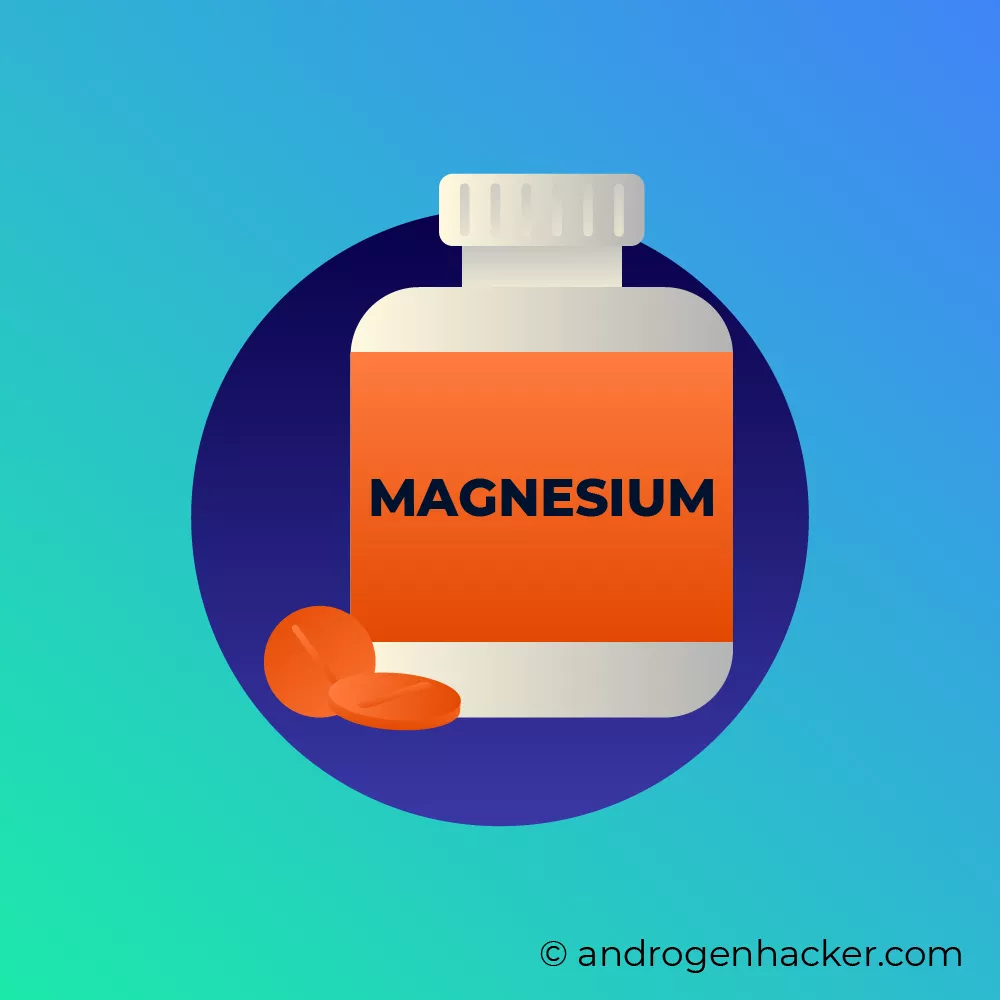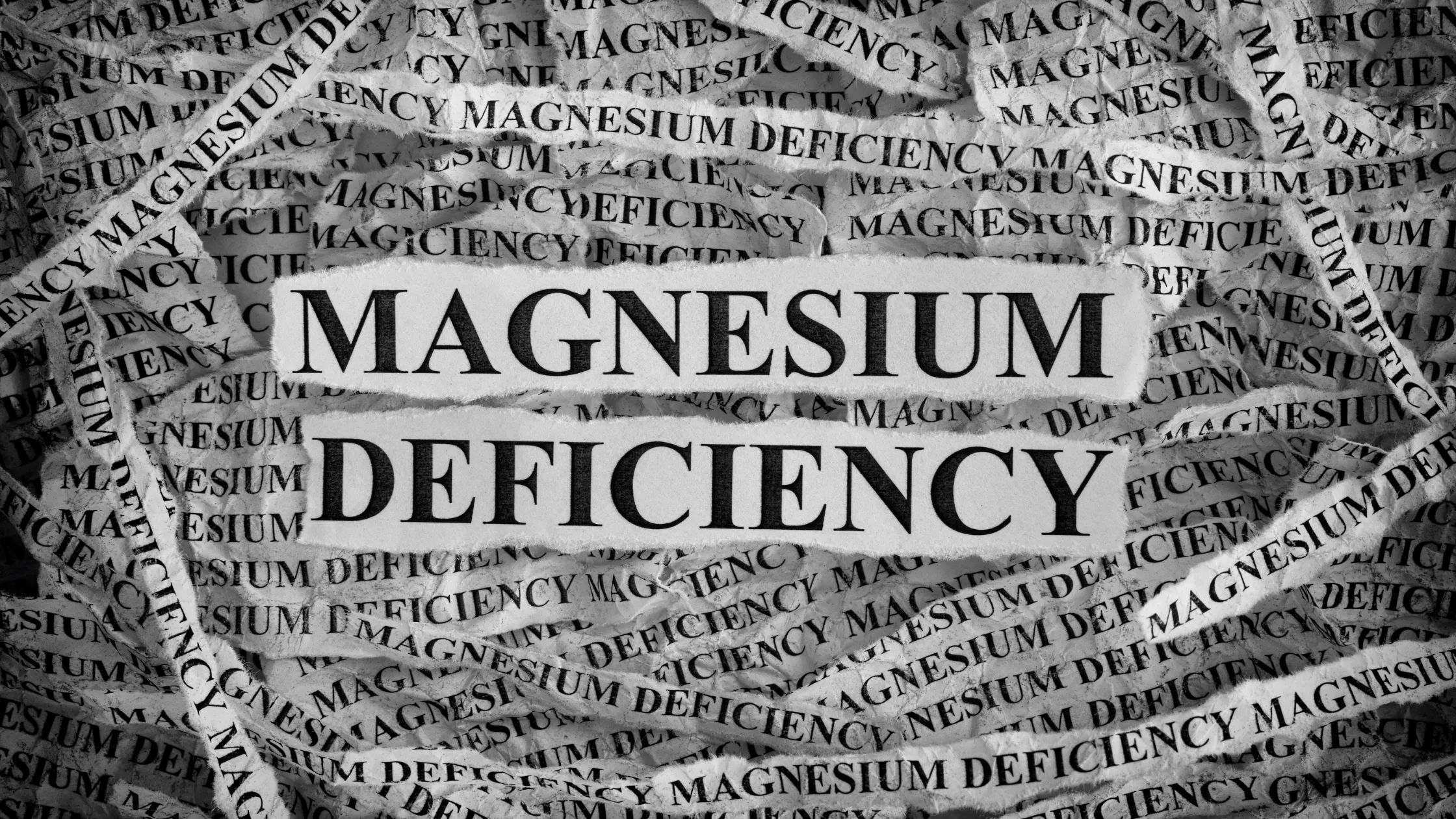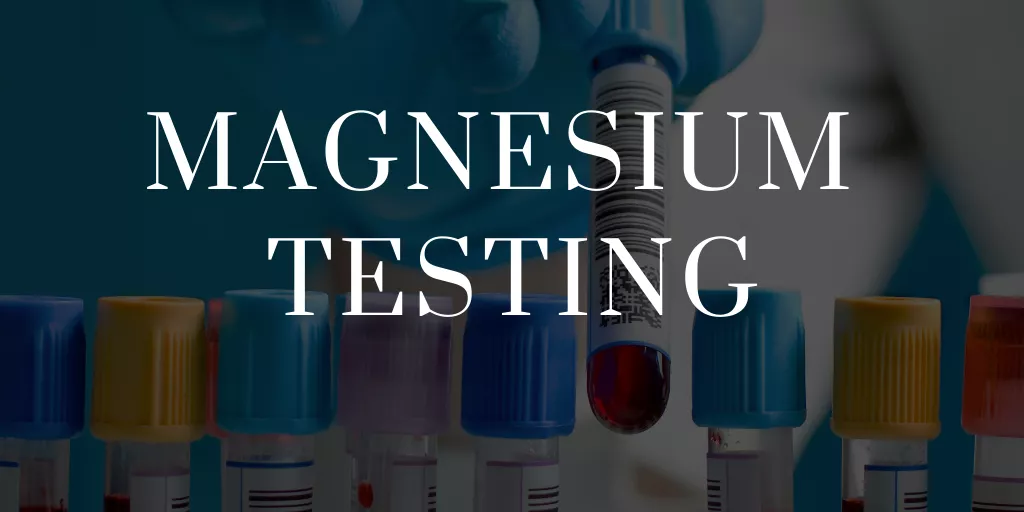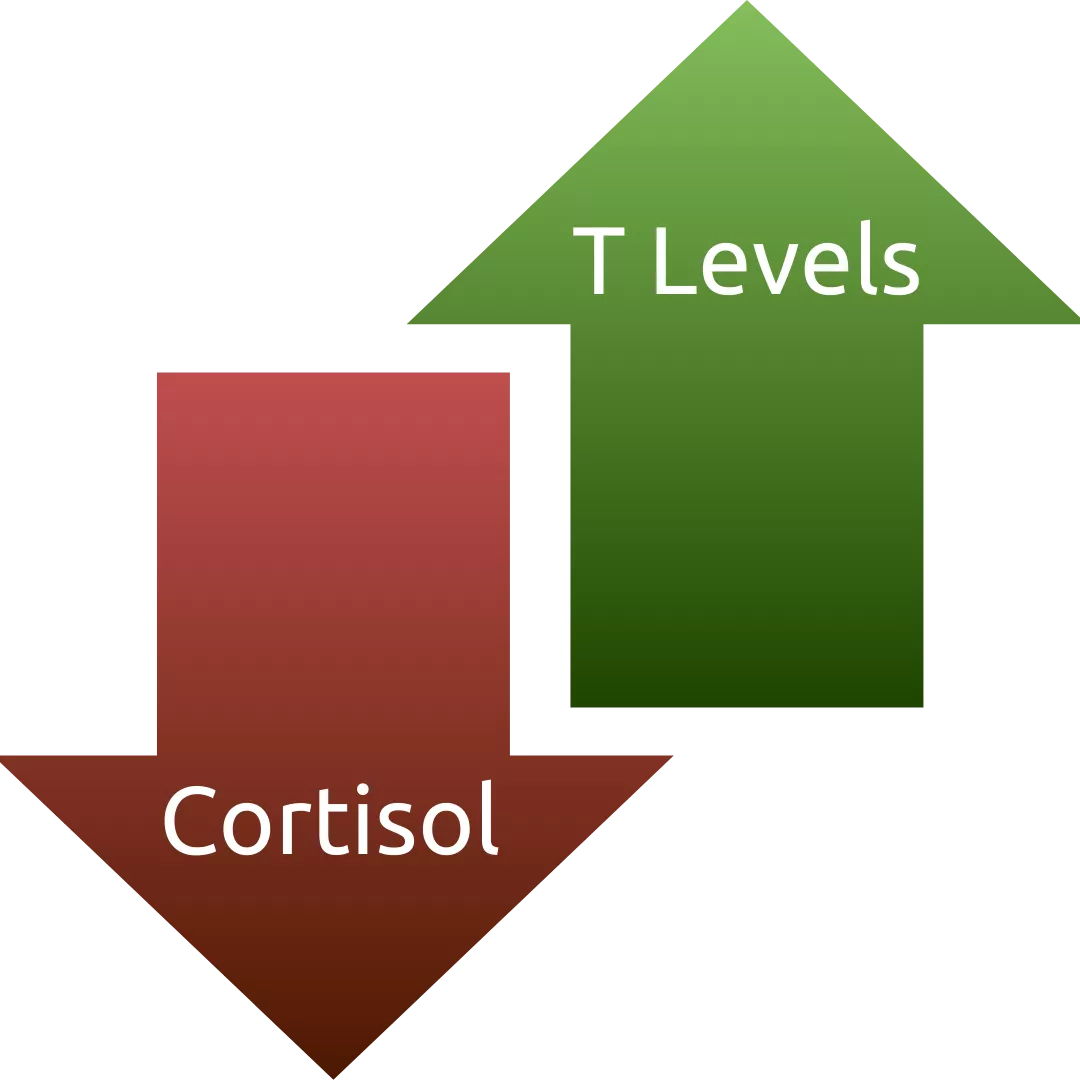Magnesium & Testosterone: The Simple Science

This is the complete guide to magnesium & its benefits:
FOR MEN 💪
But wait - Why just men?
Because recent science tells us that magnesium is a core nutrient for men who want to redline their anabolic activity (naturally).
And yet, ‘the bros’ at the gym never talk about it. That changes today.
So if you want:
✅ Higher free testosterone
✅ Better sleep
✅ Lower cortisol levels
✅ Improved insulin sensitivity
✅ & much more
Then you are going to love today’s guide.
Ready?
Let’s dig in.
TOC
1 - Magnesium/Testosterone Research
2 - Magnesium Deficiency
3 - Cortisol & Stress
4 - Sleep
5 - Blood Sugar & Inflammation
Magnesium Boosts Testosterone
Let’s start with the good stuff.
Here’s a concise video on this topic by a role model of mine, Christopher Walker.
It’s an undisputed fact:
“Magnesium plays a crucial role in testosterone production.”
It’s not a matter of “if it increases”. It’s a matter of “how much”.
And as you probably already know:
A high level of testosterone is desirable for men because it results in a plethora of desirable effects:
- Increased libido
- Improved fertility
- Increased muscle mass
- More strength
- Improved body fat distribution
If these are things that you want, then you’re going to love this next section.
TL;DR Clinical Research
Let’s look at the current body of clinical research between magnesium and testosterone:
1) 2009 - Human Study
Magnesium increases free T by “unlocking” the testosterone in SHBG.
2) 2011 - Human Study
Exercise + magnesium supplementation = A 24% increase in free testosterone levels.
3) 2011 - Cohort Analysis
Researchers concluded:
“Magnesium levels are strongly and independently associated with the anabolic hormones testosterone and IGF-1.”
And this was even after they accounted/adjusted for the kitchen sink of variables:
- Age
- BMI
- DHEAS
- SHBG
- Insulin
- IGF-1
- Grip strength
- Parkinson’s disease
- Chronic heart failure (CHF)
4) 2014 - Meta-Review
I highly recommend you take a look at this scientific review. It is jam-packed full of information regarding the relationship between magnesium, men’s health, and testosterone.
Just a few ways magnesium benefits men (discussed in this study):
- Improved muscle function
- Better physical performance
- Slowed aging
- Reduced inflammation
- And several others
But the one that stood out over the others was the relationship between magnesium, inflammation, and Low-T.
The problem:
“Inflammatory cytokines act as inhibitory factors at pituitary (on the secretion of LH) and testicular level (reduction of T secretion and sensitivity of T to LH), contributing to the development of hypogonadism.”
The solution:
“Magnesium seems to be fundamental in maintaining the threshold of antioxidant capacity and the control of oxidative stress.”
5) 2012 - Case Study
An n=1 case study showed that supplemental magnesium was most effective in increasing testosterone levels when mag levels in the blood were low.
Which leads us to:
Magnesium Deficiency

Here’s a recipe for disaster:
-
It’s well established that magnesium is super important for men who want high testosterone levels.
-
Unfortunately, almost 50% of men in the U.S. and Europe get less than the recommended amount of magnesium daily.(1)
The good news?
Deficiency Is A Modifiable Low-T Risk Factor.
Even the JCEM recognizes nutritional deficiency as a reversible cause of hypogonadism.(2)(3)
Why is this such a big deal?
Because nutrition is a limiting factor for your body’s testosterone output potential.
Said another way:
If essential micronutrients are unavailable during the testosterone production cascade, the production simply won’t happen.(4)
It’s akin to trying to make a BLT without the bacon - It ain’t going to happen.
How do you know if you are deficient in magnesium?
Simple. 👇
Get Tested

You don’t even need a doctor or insurance. Nowadays, you can do this online - for cheap.
There are several ways to go about it, but honestly, I recommend the bloodwork option. It’s the cheapest and the most accurate.
Keep in mind:
Magnesium Levels Do Change Frequently
It’s common for magnesium levels to fluctuate throughout the day. These levels change based on several factors.
Here are a few:
- Cortisol levels
- Sleep
- Blood sugar
Let’s take a closer look and see what science has to say about this list.
Cortisol
And by cortisol, I mean stress.
Well, I mean, both actually.
You can think of cortisol as the biochemical manifestation of stress.(5)
And while this statement is not wholly true, it’s not far from Accurate.
For our intents and purposes, it’s much easier to think of it this way.
Stress Sources
Unfortunately, our current way of life is a constant source of stress:
- Screen time and technology
- Financial burdens
- Poor health
- Unhealthy relationships
Stress is simply part of being human in the 21st century.
Today.
Tomorrow.
It’s not going away.
If only there were some sort of supplement to help …
😉
Testosterone vs. Cortisol - The Power Struggle
Before I reveal the solution to this stress problem, I want to make sure you and I are on the same page:
You need to understand the relationship between cortisol and testosterone:

- When cortisol levels go up, testosterone levels go down.
- When in cortisol levels go down, testosterone levels go up.
In scientific terms:
Testosterone and cortisol have an inverse relationship with one another.
The reason?
Because cortisol and testosterone compete for the the same receptor sites.
Key Takeaway
Stress causes Low T
How To Be A Happy Camper
❗ Spoiler alert ❗
.
.
.
.
(it’s magnesium)
Sure:
It’s widely recognized that mag is a core supplement for men who want higher T:
Raise testosterone levels naturally
— Marshal McKenzie 💪 (@TheForeverFit) July 29, 2020
1. Resistance train (3-4x/week)
2. Sleep 7-8+ hours
3. Minimize stress & cortisol levels
4. Get outside, more vitamin D!!!!
5. Avoid soy
6. Get to 10-15% body fat range
7. Increase lean muscle mass
8. Take magnesium
9. Have more sex
But it’s also recognized as an important mineral for mental health.(6)(7)
Specifically, it plays a role in:
- Anxiety
- Brain function
- Mood regulation
- Depression
One major reason mag seems to be so influential on mental health is its neuropsychological involvement.(8)
In fact:
We now know that magnesium helps to regulate the parasympathetic and sympathetic nervous systems.
And what’s more:
Your level of stress is determined in part by the ebb and flow between these two systems.
The parasympathetic nervous system (most often known as the “rest and digest” system) helps your body calm down. It slows your heart down and relaxes your entire body.
The sympathetic nervous system or “fight-or-flight” response system, on the other hand, leaves you in a heightened state of arousal.
And as I mentioned:
When these 2 systems get out of whack, you will see stress manifest itself in a variety of ways:
- Mental Health Issues
- Anxiety
- 👉 Low T 👈
Check it out:
The Good News
The good news is that supplementing with magnesium can help with stress.
- Nervous system - It helps your nervous system achieve equilibrium, which in result, helps decrease mental health disorders.(9)
- Depression - One study of over 8,800 people found that age below 65 and having the lowest magnesium intake recorded a 22% greater risk.(10)
- Concentration - Is Improved.(11)
- Anxiety - Is decreased.(12)
- Cortisol - is lower.(13)
And while the exact pathophysiology is not entirely clear,
We do know this:
It’s safe, it’s effective, and the result is a higher level of testosterone.
BOOM.
Sleep
What’s the connection between testosterone, magnesium, and sleep?
Check it:
“Magnesium Improves Sleep Performance”
But How?
- Calms nervous system(14)
- It regulates your circadian rhythm.(15)
- Increased levels of renin and melatonin(16)
- Improved regulation of melatonin.(17)
- Deficiency has been shown to contribute to restless sleep.(18)
Sleep Increases Testosterone
- Every hour of sleep you get converts to a 15% increase in testosterone levels.(19)
- Total sleep time has a positive correlation with T levels.(20)
- Sleep efficiency, total amount of sleep, and sleep maintenance are significantly correlated with serum testosterone levels.(21)
- As discussed above, science makes it very clear that cortisol and testosterone have an inverse relationship. It turns out, a lack of sleep is correlated with spikes in cortisol levels.(22)
A Logical Conclusion
I’ve said it before (and I’ll say it again):
Science and logic are not equally intuitive.
With that in mind, let’s look at the facts that we have established:
Fact 1 👇
Magnesium improves sleep.
Fact 2 👇
Sleep increases testosterone.
Discussion 👇
Magnesium improves sleep and therefore, magnesium increases testosterone.
Alright, one more!
Blood Sugar
We know that elevated levels of sugar in the blood results in lower levels of testosterone.(23)(24)
It turns out that magnesium plays a critical role in regulating insulin secretion.
In this regard, magnesium is very beneficial:
- It helps you control your blood glucose levels.
- It reduces your risk of developing type 2 diabetes.
Diabetes
According to science, men with lower magnesium intake have a higher risk of developing diabetes.(25)
This is especially true if you are obese. That’s because being overweight significantly increases your risk of developing diabetes.
And if you follow my work, then you already know that obesity is positively correlated with Low T.
So it’s a double whammy:
Overweight + diabetic = Men who have T Levels that are hella suppressed.
Magnesium to the rescue?
I don’t know that I’d go that far, but here’s the research:
- A study conducted in more than 4,000 men for twenty years revealed that those who had the highest magnesium intake were 47% less likely to develop diabetes.(26)
- In another clinical trial, men with type 2 diabetes taking high doses of magnesium experienced substantial improvements in hemoglobin A1c levels. Average daily blood sugar was also lower compared to the control group.(27)
- A 50 mg increase in magnesium intake results in a 3% decrease in fasting blood sugar in men with low blood magnesium levels.(28)
Sugar consumption is correlated with lower sperm motility & testosterone production.
— Chief Pharmacist (@ChiefPharmacst) July 16, 2020
Caffeiniated & Soft drink can also affect fertility.
Excessive sugar intake turns off testosterone synthesis.
Sugar & Inflammation
So we now know that magnesium plays a crucial role in blood sugar balance.
What you may not know:
High blood sugar leads to insulin resistance. And insulin resistance has a proven relationship with inflammation.(29)(30)(31)
“Studies in human obesity and insulin resistance have revealed a clear association between the chronic activation of pro-inflammatory signaling pathways and decreased insulin sensitivity.”(32)
People with blood sugar dysregulation commonly suffer from inflammation-related problems.
You know the type:
- Obese
- Frequent seasonal illness
- Brain Fog
- Random unexplained aches and pains
- Chronic fatigue
I don’t know about you, but to me this list looks very similar to any classic list of low T symptoms.
Bonus: Foods High In Magnesium
Science tells us that it is possible to get enough magnesium from diet alone. (33)
But what testosterone foods can we eat to increase the amount of magnesium in our diet?
👇👇👌👌💪💪
| T Booster Food | Serving Size | Mag |
|---|---|---|
| Pumpkin seeds | 1 oz | 168 mg |
| Almonds | 1 oz | 80 mg |
| Spinach | ½ cup | 78 mg |
| Cashews | 1 oz | 74 mg |
| Black beans | ½ cup | 60 mg |
| Dark chocolate | 1 oz | 50 mg |
| Avocado | 1 cup | 44 mg |
| Potatoe | 3.5 oz | 43 mg |
| Plain yogurt | 8 oz | 42 mg |
| Kidney beans | ½ cup | 35 mg |
| Banana | 1 medium | 32 mg |
| Cocoa powder | 1 Tbsp | 27 mg |
| Salmon | 3 oz | 26 mg |
| Halibut | 3 oz | 24 mg |
| Raisins | ½ cup | 23 mg |
| Chicken Breast | 3 oz | 22 mg |
| Beef 90/10 | 3 oz | 20 mg |
| Broccoli | ½ cup | 12 mg |
| White rice | ½ cup (cooked) | 10 mg |
| Apple | 1 medium | 9 mg |
Related Resources
-
ZMA & Sleep - Article
-
Magnesium For Men’s Health - Article
-
Dosage & Safety Guide - .Gov Resource
-
Cheap Magnesium Lab Testing - Affiliate Link
-
The Magnesium Supplement I Use - Affiliate Link
Summary And Key Takeaways
Magnesium has many benefits for men.
Primarily:
It is a powerful and scientifically proven testosterone booster.
“There is a growing body of scientific literature suggesting a direct cause/effect relationship between magnesium & testosterone.”
But there is also a correlative relationship:
- It reduces stress.
- It improves sleep quality.
- It reduces average blood glucose.
- It reduces inflammation.
This list represents a fraction of the health benefits, but is unique in that each of these has individually been proven to increase male testosterone levels in isolation.
I hope you enjoyed this article and found it beneficial. If so, you can show your appreciation by sharing it with your friends.
Thanks is for reading.
Kind regards,
David, RN, CCRN

